NOW WE'VE had a week to digest Richmond's Grand Final triumph over Greater Western Sydney, here are some of the standout statistics that fascinated us.
Probably best to look away, Giants fans.
Eleven-goal heaven
Hopes were high for a tough contest when Giants star Jeremy Cameron slotted the first goal after 20 minutes, before Richmond blew the game apart with the next 11 goals.
By the late stages of the third quarter the Tigers led 11.9 (75) to just 1.7 (13).
As far as we can tell after diving into the archives, that burst was a record in a Grand Final.
Not even Geelong kicked that many on end when it smashed Port Adelaide by a record 119 points in 2007.
The Cats scored 10 consecutive goals – their last 10 goals in fact – to advance the score of 14.15 (99) to 5.4 (34) midway through the third quarter, to the extraordinary 24.19 (163) to just 5.5 (35) late in the final term.
Jack the Giant slayer
Richmond sharpshooter Jack Riewoldt became just the fourth player in history, and the first in 59 years, to outscore the opposition himself in a Grand Final.
In a seesawing battle between GWS and Riewoldt, the Giants hit the scoreboard first, Riewoldt piled on the next three goals and the Giants hit back with the next two before the irrepressible Tiger kicked two unanswered majors in the last quarter to take the honours by six points – 5.1 (31) to 3.7 (25).
It was the three-time Coleman medallist's first five-goal haul since he played a lone hand in last year's preliminary final loss to Collingwood, and the only five-goal haul against GWS this year.
Jack's back - not that he went away for long. Picture: AFL Photos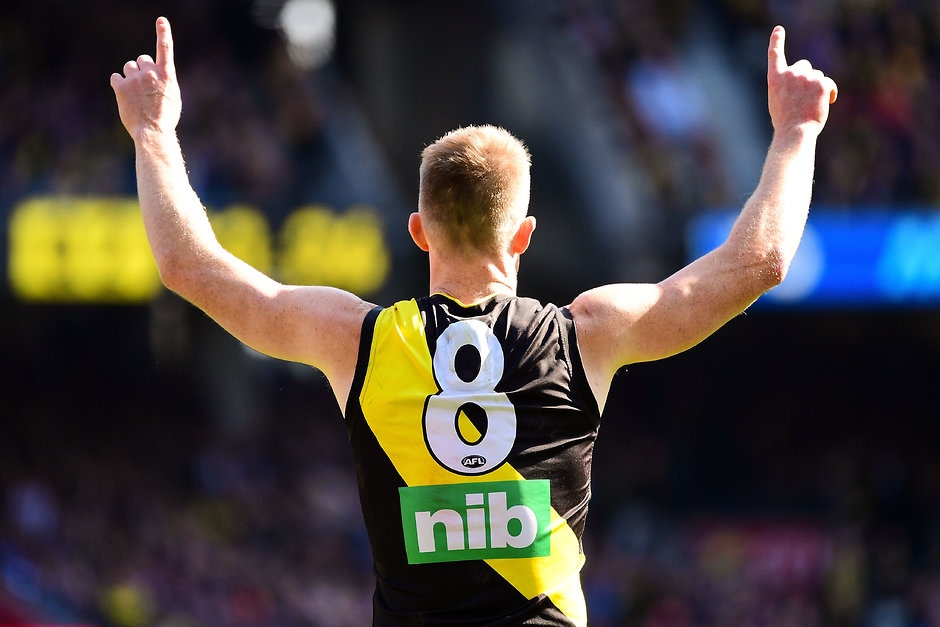
Remarkably, the Tigers came within a whisker of becoming the first team to have two players outpoint the opposition in a Grand Final, with dual Norm Smith medallist Dustin Martin contributing 4.0 (24) – a solitary point short of GWS.
Riewoldt was the first to achieve the feat since 1960, when Melbourne forward/ruckman Robert 'Big Bob' Johnson's 2.3 (15) edged out Collingwood's 2.2 (14).
Recently deceased Demons great Frank 'Bluey' Adams also scored 2.1 and fellow star Hassa Mann 2.0.
In 1927 Collingwood legend Gordon Coventry's tally of at least 2.2 (14) pipped Richmond's 1.7 (13), and in 1901 Essendon legend Albert Thurgood's three goals (and an undetermined number of behinds) beat the Magpies' 2.4 (16).
Year | Player | Tally | Opposition | Differential |
2019 | Jack Riewoldt (Rich) | 5.1 (31) | GWS 3.7 (25) | +6 |
1960 | Bob Johnson (Melb) | 2.3 (15) | Coll 2.2 (14) | +1 |
1927 | Gordon Coventry (Coll) | 2.2 (14)* | Rich 1.7 (13) | +1 |
1901 | Albert Thurgood (Ess) | 3.0 (18)* | Coll 2.4 (16) | +2 |
* Exact tally of behinds is uncertain.
Who says you don't get percentage in finals?
The 89-point margin was the third-biggest in Grand Finals, behind Geelong's 119-point win over Port Adelaide in 2007 and Hawthorn's 96-point victory over Melbourne in 1988.
However, percentage-wise, the Tigers produced the most dominant performance in Grand Final history, their total of 17.12 (114) being four-and-a-half times bigger than the Giants' 3.7 (25).
% | Teams | Year |
456 | Rich 17.12 (114) v GWS 3.7 (25) | 2019 |
442.9 | Melb 8.14 (62) d Coll 2.2. (14) | 1960 |
370.5 | Geel 24.19 (163) d PA 6.8 (44) | 2007 |
271.4 | Haw 22.20 (152) d Melb 6.20 (56) | 1988 |
268.6 | Ess 6.7 (43) d Coll 2.4 (16) | 1901 |
Fluctuating fortunes of Lynch's mobs
Tigers spearhead Tom Lynch was back to his high-leaping best this season, but the biggest leap he made was up the ladder.
The former Gold Coast co-captain vaulted an equal-record 16 ladder places – from 17th with the Suns last year to first.
His effort matches that of Hawthorn defender James Frawley, who left 17th-placed Melbourne at the end of 2014 and played in a premiership the next season with the Hawks.
Lynch also became just the third captain to leave a club and win a flag the next year. The others were David Thorpe (Footscray captain in 1973 and Richmond premiership player in 1974) and Stan Alves (Melbourne captain in 1976 and North Melbourne premiership player in 1977).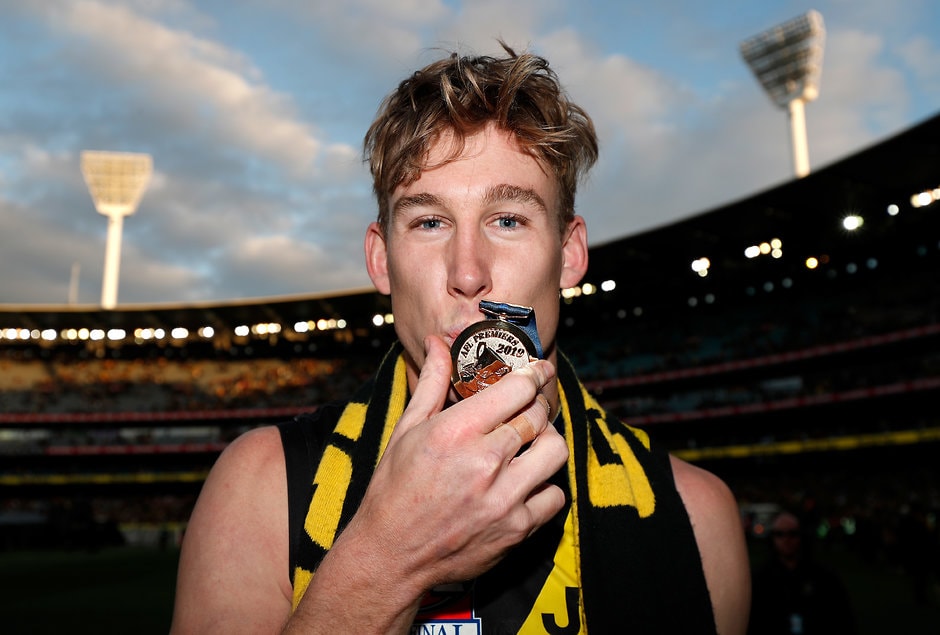
Castagna's relief
The landslide result saved Richmond forward Jason Castagna considerable regret after he was goalless from six shots.
The opportunist spoiled an otherwise strong 20-possession performance as he blazed 0.5 and one out on the full, giving him a wayward tally of 2.14 from his past four outings against GWS.
But Castagna's inaccuracy was by no means the worst in a Grand Final.
'George' Castagna's Grand Final was close to brilliant ... five times. Picture: AFL Photos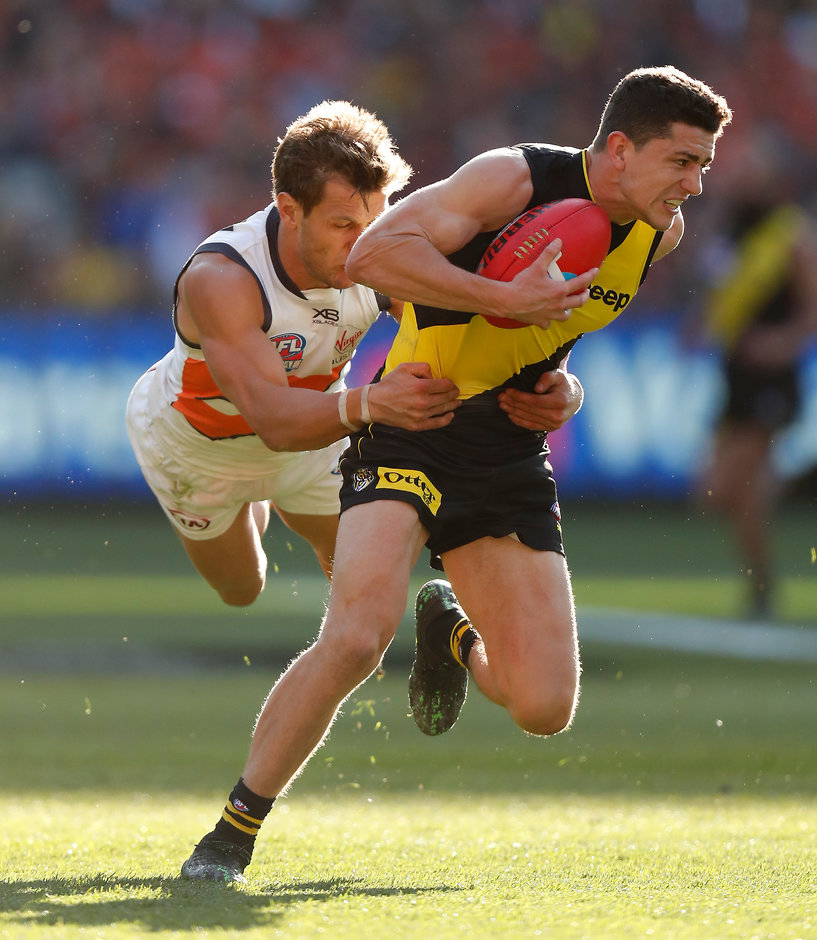
That title is probably shared by Collingwood's legendary goal machine Gordon Coventry and North Melbourne forward Arnold Briedis, both of whom who sprayed 0.7.
Coventry's rare goalless outing might well have cost the Magpies the 1925 premiership given they were beaten by Geelong by just 10 points.
Briedis had an off day in the Kangaroos' draw with Collingwood in the 1977 Grand Final. However, he made amends in the replay the next week by bagging a game-high 5.3 in a 27-point win.
The previous year Hawthorn half-forward John Hendrie kicked 2.8 in a 30-point win over North.
For many years Essendon full-forward Bill Brittingham was the scapegoat for the Bombers' disastrous tally of 7.27 (69) in the 1948 drawn Grand Final against underdog Melbourne (which won the replay convincingly). A myth persisted that Brittingham had finished with the horrific return of 2.12, when his actual contribution was 2.3.
In contrast, St Kilda hero Barry Breen kicked the game's most famous point to lift the Saints to their only premiership in 1966 against Collingwood, and his return of 0.4 (he reckons it was 0.5) is virtually forgotten.
Pies pair Vin Doherty (0.5) and Ron Todd (4.9 from 16 shots) squandered numerous opportunities in the 1936 Grand Final, but weren't made to pay for their recklessness as the Woods prevailed by 11 points over South Melbourne.
Swans superstar Bob Pratt finished with 3.8 and missed everything with another shot in the 1933 decider, but he still almost beat Richmond's total of 4.5 (29).
Melbourne legend Norm Smith kicked 1.6 in a 53-point win over Collingwood in the 1939 Grand Final.
Among those haunted by their failures in front of the big sticks include Geelong utility Russell Renfrey, whose 0.5 proved costly in a 12-point loss to Collingwood in the 1953 play-off.
Coventry was also off target in the famous 1937 Grand Final with 3.7 in the Woods' 32-point loss to Geelong.
For balance, it's important to note that Coventry was brilliant in several Grand Finals, bagging a record 9.4 in the 1928 win over Richmond (which tallied just 9.9), 7.5 in the 1930 victory over Geelong, and outscoring Richmond himself in the low-scoring 1927 decider.
Jeremy's jitters
It will be a long summer for Giants forward Jeremy Finlayson, who had just one possession in 63 per cent game time.
It was the equal-worst effort by a player in a Grand Final in 15 years – since Brisbane Lions veteran full-forward Alastair Lynch failed to have a single disposal in the 2004 loss to Port Adelaide.
Finlayson had more of the ball before he ran through the banner than afterwards. Picture: AFL Photos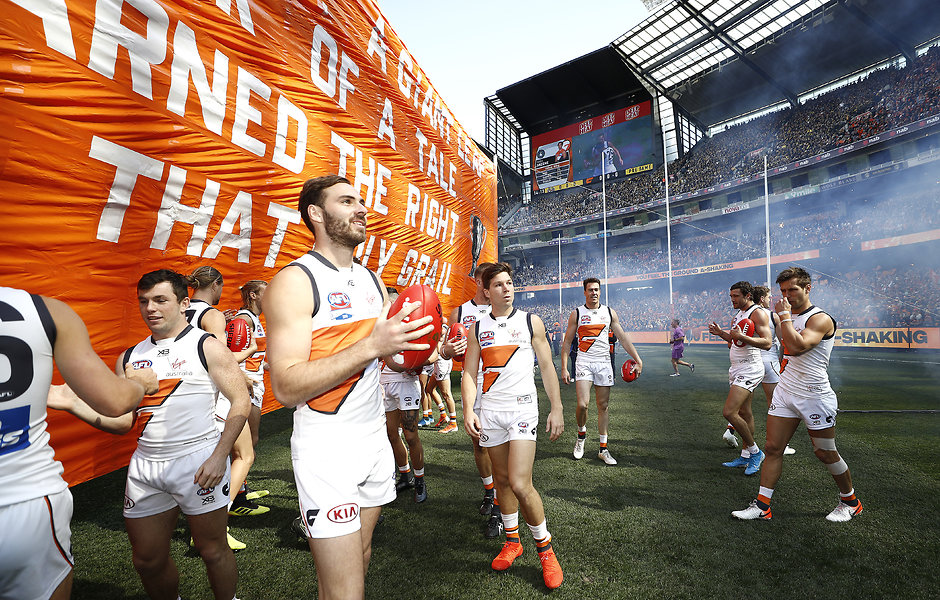
In an embarrassing last game for the triple-premiership Lion, Lynch started a fight that resulted in a 10-game suspension and managed just 47 per cent game time as he battled a quad injury.
Hawthorn key defender Trent Croad also had just one touch in the 2008 Grand Final, but he had an excuse – he suffered a career-ending foot injury in the second quarter of the upset win over Geelong.
Collingwood's teenage big man Tristen Walker had only one possession in 49 per cent game time in the 2003 loss to Brisbane.
The previous year Magpie small forward Leon Davis had 'donuts', although he was credited with three tackles, in another defeat to the Lions.
Streaky Tigers
While conjuring its most complete performance in a Grand Final, Richmond also equalled the club record for its greatest winning run.
The Tigers have now won 12 games in a row, matching the effort of the club's 1932 premiership team.
It has been a sensational revival given that the hot streak started after their mid-season bye when they had slumped to 7-6 and a percentage of just 92, landing them in ninth position, outside the top eight by 16.2 per cent.
The reigning premier will have a golden opportunity to claim the outright club record of 13 successive wins in their 2020 season-opener against Carlton
Since the Tigers went down to Adelaide by 33 points at Adelaide Oval in round 13 – their third defeat on the trot – coach Damien Hardwick has remained on 99 career losses.
That's along with his 130 wins and two draws and an ever-increasing 56.7 per cent strike rate.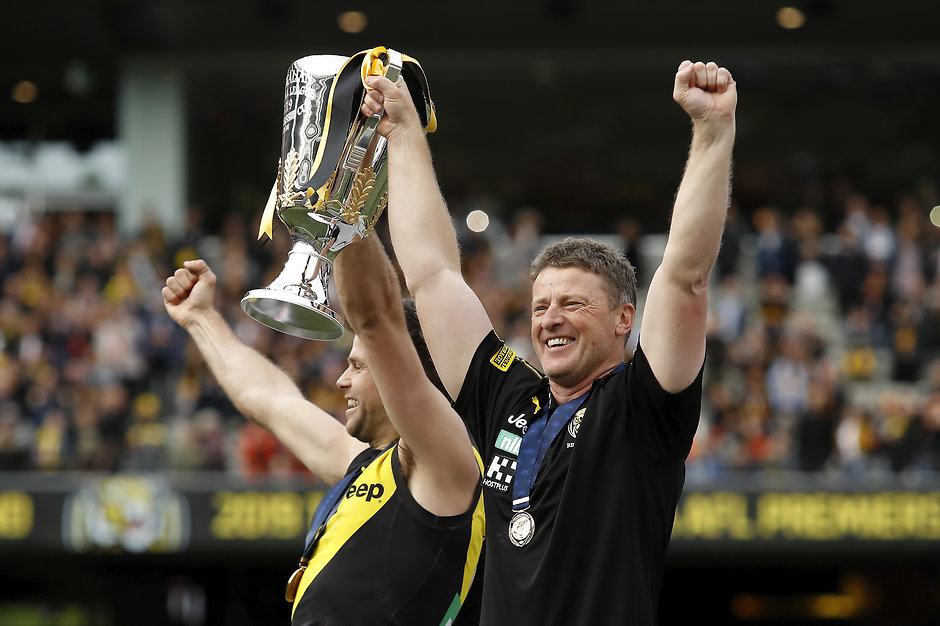
Wins | Span | Ave. margin |
12* | R15, 2019 – | 39 |
12 | R11, 1932 – R2, 1933 | 29 |
11 | R4, 1980 – R14, 1980 | 49 |
10 | R13, 1934 – R2, 1935 | 29 |
10 | R13, 1967 – R2, 1968 | 37 |
10 | R14, 1972 – QF, 1972 | 38 |
* Unbroken
Marlion the Magnificent
Unless you've been living under a rock you'll know that one-game sensation Marlion Pickett became just the sixth player to debut in a Grand Final, and the first in 67 years.
The Tigers' mid-season recruit was the fourth among this group to win a first-up premiership, and the first in 93 years.
The 27-year-old West Australian also played in front of the biggest crowd for a debutant, with 100,014 fans cramming into the MCG.
Pickett, who donned No.50, was just the seventh player to wear a number as high as 50 in the season decider, and the fifth in succession to win a flag.
Crowd | Player | Game | Opp | Result |
100,014 | Marlion Pickett (Rich) | GF, 2019 | GWS | W89 |
95,614 | Travis Payze (St K) | SF, 1966 | Coll | L10 |
95,386 | Len Thompson (Coll) | PF, 1965 | Ess | L55 |
94,825 | Jason Wild (Coll) | R4, 1995 | Ess | Tie |
94,451 | Scott Howell (Carl) | SF, 1980 | Coll | L50 |
92,436 | David Miller (Rich) | R4, 1977 | Coll | L26 |
91,857 | Graeme Dunstan (Coll) | SF, 1972 | St K | L18 |
Other odds and ends
- It's been well documented that the Giants' total of 3.7 (25) was the lowest in a Grand Final since Collingwood's 2.2 in 1960. It was also the first time a team had kicked the lowest score in its history in a Grand Final. And it was the third-lowest score by a team in its first Grand Final, only marginally better than Collingwood's 2.4 (16) in 1901 and Essendon's 3.5 (23) in 1898.
- Richmond and GWS ended up with exactly the same number of goals and behinds for the season – 322 goals and 271 behinds for a grand total of 2203 points. Of course, the Giants played one more final. This has happened just once before – 50 years ago when non-finallists St Kilda and South Melbourne both tallied 257.261 (1803).
- Among premiership teams, the injury-hit Richmond used the equal-second-most players. Fitzroy used a record 44 players in 1944, followed by the Western Bulldogs in 2016 and three Tiger teams (1943, 1969 and 2019) with 39. Those to have used 38 comprise two more Richmond line-ups (1974 and 2017), North Melbourne in 1977 and Adelaide in 1998.
Most of the above information was provided by Stephen Rodgers and Col Hutchinson.


